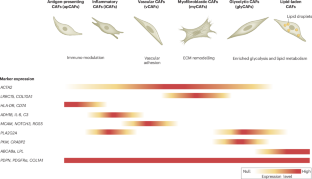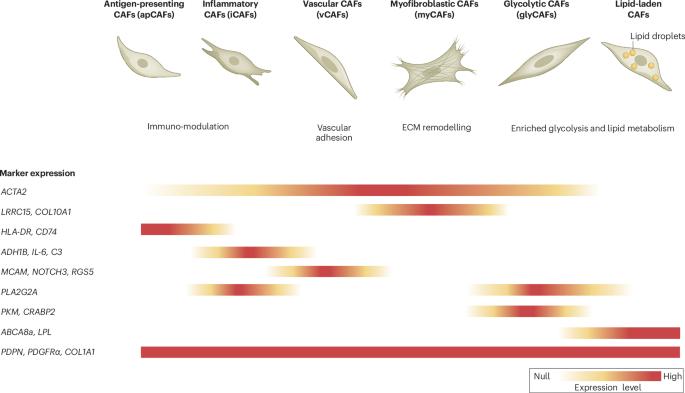控制实体瘤中 T 细胞状态和定位的 CAF 诱导物理约束
IF 72.5
1区 医学
Q1 ONCOLOGY
引用次数: 0
摘要
实体瘤由癌细胞组成,这些癌细胞与非恶性细胞和无细胞成分不断相互作用,形成肿瘤微环境(TME)。肿瘤微环境在肿瘤进展和转移过程中起着至关重要的多种作用,人们一直致力于了解肿瘤微环境中不同类型细胞的功能。这些努力凸显了非细胞自主信号在癌症中的重要性,它介导着癌细胞、免疫微环境和非免疫基质之间的相互作用。这种非细胞自主信号大多通过 TME 的细胞外基质 (ECM) 的细胞成分介导,并受控于分泌和重塑 ECM 的细胞--癌症相关成纤维细胞 (CAF)。在这篇综述中,我们将深入探讨癌细胞、CAFs 和免疫细胞之间复杂的相互关系,强调 CAF 诱导的 ECM 重塑对 T 细胞功能的影响,并深入探讨以 ECM 成分为靶点改善癌症疗法的潜力。本文章由计算机程序翻译,如有差异,请以英文原文为准。


CAF-induced physical constraints controlling T cell state and localization in solid tumours
Solid tumours comprise cancer cells that engage in continuous interactions with non-malignant cells and with acellular components, forming the tumour microenvironment (TME). The TME has crucial and diverse roles in tumour progression and metastasis, and substantial efforts have been dedicated into understanding the functions of different cell types within the TME. These efforts highlighted the importance of non-cell-autonomous signalling in cancer, mediating interactions between the cancer cells, the immune microenvironment and the non-immune stroma. Much of this non-cell-autonomous signalling is mediated through acellular components of the TME, known as the extracellular matrix (ECM), and controlled by the cells that secrete and remodel the ECM — the cancer-associated fibroblasts (CAFs). In this Review, we delve into the complex crosstalk among cancer cells, CAFs and immune cells, highlighting the effects of CAF-induced ECM remodelling on T cell functions and offering insights into the potential of targeting ECM components to improve cancer therapies. In this Review, Arpinati et al. summarize how the extracellular matrix, produced primarily by cancer-associated fibroblasts, impacts tumour progression, metastasis and therapy response through modulation of T cell-mediated antitumour immunity and propose routes to target these mechanisms therapeutically.
求助全文
通过发布文献求助,成功后即可免费获取论文全文。
去求助
来源期刊

Nature Reviews Cancer
医学-肿瘤学
CiteScore
111.90
自引率
0.40%
发文量
97
审稿时长
6-12 weeks
期刊介绍:
Nature Reviews Cancer, a part of the Nature Reviews portfolio of journals, aims to be the premier source of reviews and commentaries for the scientific communities it serves. The correct abbreviation for abstracting and indexing purposes is Nat. Rev. Cancer. The international standard serial numbers (ISSN) for Nature Reviews Cancer are 1474-175X (print) and 1474-1768 (online). Unlike other journals, Nature Reviews Cancer does not have an external editorial board. Instead, all editorial decisions are made by a team of full-time professional editors who are PhD-level scientists. The journal publishes Research Highlights, Comments, Reviews, and Perspectives relevant to cancer researchers, ensuring that the articles reach the widest possible audience due to their broad scope.
 求助内容:
求助内容: 应助结果提醒方式:
应助结果提醒方式:


